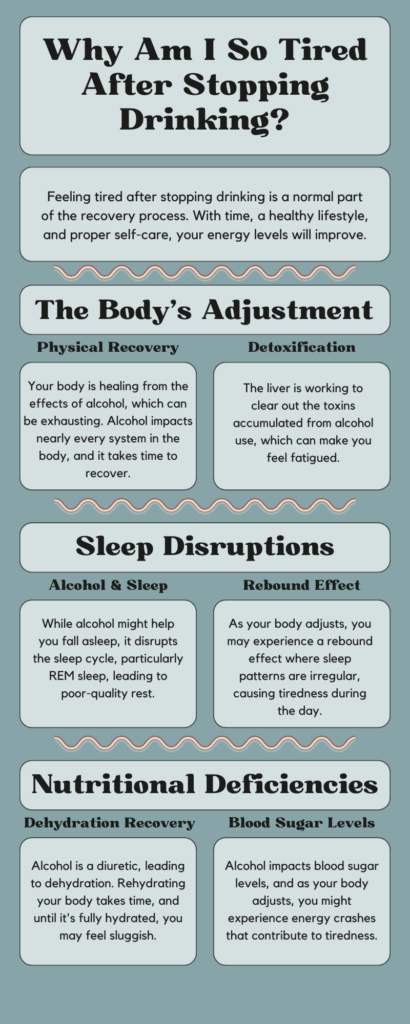Deciding to quit drinking is a significant and commendable step towards a healthier and more fulfilling life. However, many people who stop drinking find themselves struggling with an unexpected side effect: fatigue. Feeling tired after quitting alcohol is common, but understanding why this happens and how to manage it can make the transition smoother. In this blog, we’ll explore the reasons behind this fatigue, its effects, and practical strategies to overcome it.
The Connection Between Alcohol and Fatigue

The Impact of Alcohol on Sleep
Alcohol is known to affect sleep patterns significantly. While it may initially make you feel drowsy and help you fall asleep faster, it disrupts the sleep cycle. Alcohol reduces REM (rapid eye movement) sleep, which is crucial for restorative rest. When you stop drinking, your body needs time to adjust and normalize its sleep patterns. This adjustment period can contribute to feelings of fatigue as your body re-learns how to achieve restful, uninterrupted sleep.
Withdrawal Symptoms and Fatigue
When you stop drinking, your body undergoes withdrawal, which can manifest in various ways, including fatigue. Withdrawal symptoms occur because your body is adjusting to the absence of alcohol, which it has become dependent on over time. This process can be physically and mentally taxing, leading to tiredness and lethargy.
Nutritional Deficiencies
Chronic alcohol use can lead to deficiencies in essential vitamins and minerals, such as B vitamins, magnesium, and zinc. These deficiencies can affect your energy levels and overall well-being. After stopping drinking, your body needs time to replenish these nutrients, which can contribute to feelings of fatigue.
Managing Fatigue After Quitting Alcohol
Establishing a Healthy Sleep Routine
One of the most effective ways to combat fatigue is to establish a healthy sleep routine. Aim for 7-9 hours of quality sleep each night. Create a calming bedtime routine, avoid screens before bed, and keep your sleep environment dark and cool. Consistent sleep patterns can help regulate your body’s internal clock and improve your energy levels over time.
Nutrition and Hydration
Eating a balanced diet rich in fruits, vegetables, lean proteins, and whole grains can support your recovery and boost your energy. Ensure you’re staying hydrated, as dehydration can exacerbate feelings of fatigue. Drinking plenty of water and avoiding excessive caffeine can help maintain your energy levels throughout the day.
Physical Activity
Engaging in regular physical activity can improve your energy levels and overall mood. Exercise releases endorphins, which are natural mood lifters, and helps regulate your sleep patterns. Start with light activities, such as walking or yoga, and gradually increase the intensity as you feel more comfortable.
Managing Stress
Stress can contribute to fatigue, especially during the early stages of recovery. Finding healthy ways to manage stress, such as through mindfulness, meditation, or talking to a therapist, can help reduce its impact on your energy levels. Developing coping strategies and seeking support can also improve your overall well-being.
Seeking Professional Support
If fatigue persists or becomes overwhelming, seeking professional support is crucial. A healthcare provider or addiction specialist can help assess your symptoms and provide guidance on managing fatigue and other withdrawal symptoms. They may also recommend supplements or other treatments to address nutritional deficiencies and support your recovery.
Learn More About The Effects of Drinking
Feeling tired after stopping drinking is a common experience, but understanding the underlying causes and implementing practical strategies can help you manage and overcome this fatigue. By establishing healthy sleep habits, maintaining a balanced diet, engaging in regular exercise, managing stress, and seeking professional support, you can enhance your recovery journey and regain your energy.
If you’re looking for comprehensive support during your recovery, Aligned Living offers avirtual mental health and drug rehab aftercare program designed to help individuals navigate the challenges of sobriety. Our program provides personalized care, resources, and guidance to support your journey towards a healthier, more fulfilling life. Reach out to Aligned Living today to learn more about how we can help you thrive in your recovery.

